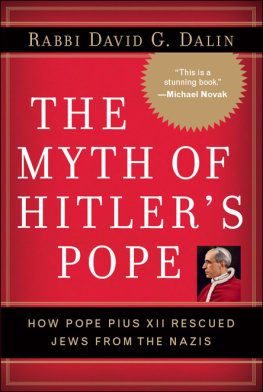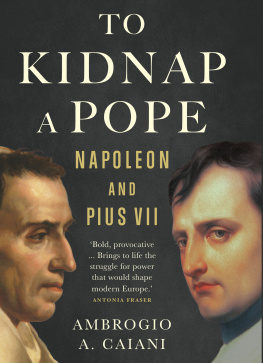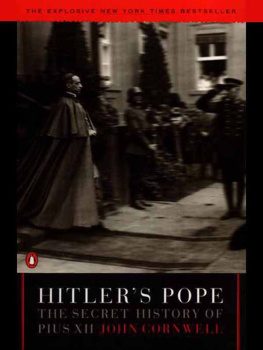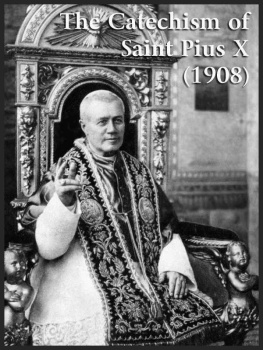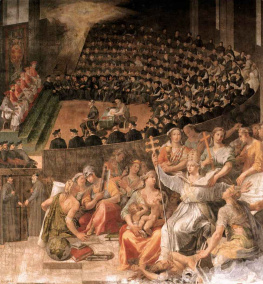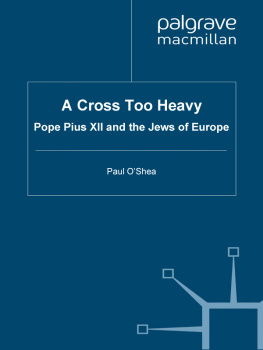Robin Anderson - Pope Pius VII: (1800-1823)
Here you can read online Robin Anderson - Pope Pius VII: (1800-1823) full text of the book (entire story) in english for free. Download pdf and epub, get meaning, cover and reviews about this ebook. year: 2016, publisher: TAN Books, genre: Religion. Description of the work, (preface) as well as reviews are available. Best literature library LitArk.com created for fans of good reading and offers a wide selection of genres:
Romance novel
Science fiction
Adventure
Detective
Science
History
Home and family
Prose
Art
Politics
Computer
Non-fiction
Religion
Business
Children
Humor
Choose a favorite category and find really read worthwhile books. Enjoy immersion in the world of imagination, feel the emotions of the characters or learn something new for yourself, make an fascinating discovery.

- Book:Pope Pius VII: (1800-1823)
- Author:
- Publisher:TAN Books
- Genre:
- Year:2016
- Rating:5 / 5
- Favourites:Add to favourites
- Your mark:
- 100
- 1
- 2
- 3
- 4
- 5
Pope Pius VII: (1800-1823): summary, description and annotation
We offer to read an annotation, description, summary or preface (depends on what the author of the book "Pope Pius VII: (1800-1823)" wrote himself). If you haven't found the necessary information about the book — write in the comments, we will try to find it.
Pope Pius VII: (1800-1823) — read online for free the complete book (whole text) full work
Below is the text of the book, divided by pages. System saving the place of the last page read, allows you to conveniently read the book "Pope Pius VII: (1800-1823)" online for free, without having to search again every time where you left off. Put a bookmark, and you can go to the page where you finished reading at any time.
Font size:
Interval:
Bookmark:
POPE PIUS VII
1800 1823
HIS LIFE, REIGN AND STRUGGLE WITH NAPOLEON IN THE AFTERMATH OF THE FRENCH REVOLUTION
Professor Robin Anderson
Copyright 2001 by Robin Anderson.
Library of Congress Control No. 00-134500
ISBN 0-89555-678-2
All rights reserved. No part of this book may be reproduced or transmitted in any form or by any means, electronic or mechanical, including photocopying, recording, or by any information storage or retrieval system, without permission in writing from the publisher, except that brief passages may be quoted or copied for non-profit use without permission.
Cover Illustration: Portrait of Pius VII, by Jacques Louis David (1748-1825). Louvre, Paris, France. Runion des Muses Nationaux/Art Resource, NY.
TAN Books
Charlotte, North Carolina
www.TANBooks.com
2001
Dedicated
with respect and affection
to the late
John J. Cardinal Wright,
who asked me to write about
Pope Pius VII.
"For the foolishness of God is wiser than men; and the weakness of God is stronger than men."
1 Corinthians 1:25
OTHER WORKS BY THE AUTHOR
Rome Churches for English-Speaking People
The Quiet Grave (Journals)
St. Pius V
Between Two WarsThe Life of Pius XI
Gleams of English-Language Literature
Collected prose and poetry
Crisis Popes (private circulation)
CONTENTS

General overview of Italy and eastern France (with modern boundaries), showing the cities that figured so prominently in the life of Pope Pius VII: Venice, Rome, Savona, Fontainebleau and Paris.
PROLOGUE
A Glance Back at the 18th Century
The conclave had dragged on for nearly four months in the Venetian island Abbey of St. George (San Giorgio), where the electing cardinals had assembled because of political conditions in Rome and Europe on the death of Pope Pius VI. On March 15, 1800, the Benedictine Cardinal Gregory Barnabas Chiaramonti accepted election and, out of gratitude to his predecessor and benefactor, took the name of Pius VII.
Venice was then under the government of Austria, whose rulers, members of the house of Hapsburg, had from medieval times held the title of Holy Roman Emperor. Pius was obliged to go much of the way by sea in a dilapidated, badly equipped old boat, escorted by the Emperor's envoy.
But by the time Pius VII would be able to enter his capital at the beginning of July, General Napoleon Bonaparte's victory over the Austrian forces at Marengo would have altered the European balance of power. The Pope would find himself no longer fettered by the Emperor Francis but rather confronted by one other manthe general who had risen to power in France, Napoleon, the " First Consul," who in a few years was to become "Emperor of the French" and lord of most of Europe.
Napoleon's fourteen-year rule (1799-1814) was to prove a very mixed blessing for France and for the Church. A man of military genius and amazing energy, he restored order after the turmoil and bloodshed of the French Revolution, launched in 1789; but Napoleon was to some extent imbued with the tenets of the Revolution. His unbounded political ambition further caused him to contest the sacred rights of the Pope and the Church, rights which he endeavored to dominate and use for ruling and extending his empire. The first half of Pius VII's reign would be taken up by his struggle with Napoleon.
The death of Pope Pius VI in France in August 1799, a prisoner of the French Revolutionaries, had left the Catholic Church in an apparently catastrophic, not to say hopeless plight. The Pope was sneeringly called "Pius VI the Last." Many thought, not for the first time, that the papacy was finished.
During the 18th century, just closing, things had gone from bad to worse. Philosophies such as Kant's in Germany and Hobbes' in England had discarded supernatural faith in divine revelation. They led the way to the so-called Illuminism of the French philosophers and encyclopaedists who purported to propagate modern science and culture. In fact, neither culture nor science were propagated. The Age of Reason was proclaimed: mankind had been in its infancy, but was now adult for the first time.
The writings of Rousseau and Voltaire had popularized notions of man's natural goodness with no need for authority and law in Church or society. The way was paved for revolution. In 1786, the Illuminatist (not Illuminist) society, secretly founded in Bavaria by Weishaupt with anarchical aims, was discovered and banned. But some of the conspirators found refuge in France, where Weishaupt managed to merge with Masonry.
), Mirabeau and the Duke of Orleans (who provided the money) were members, along with others who were to become leading protagonists of the French Revolutionincluding the half-mad Cagliostro, hater of priests and kings.
The pre-revolutionary movement was less a political and philosophical movement than a religious one. Jansenism, originating with Jansenius, Bishop of Ypres (1585-1638), in the 17th century, was possibly the most formidable heresy that ever arose in the Church. Hostile to Rome and papal authority, and to the Jesuits in particular, it contested the Church's magisterium and power of jurisdiction, but hid its true nature under various reforming ideals.
Even after Pope Clement XI's definitive condemnation in 1713, Jansenism found ways of surviving. Benedict XIV (1740-1758), called "the Protestant Pope" by some of his cardinals for his over-conciliatory policy, was lenient with the Jansenists. The next Pope, Clement XIII (1758-1769), protested in vain to the Catholic sovereigns of Europe, who were being influenced by Jansenist counselors to banish the Jesuits, strongest defenders of the papacy and leaders in evangelization, missionary work and education. At length the succeeding Pope, Clement XIV, threatened on all sides by powerful princes and for the sake of peace, as he said, in 1773 decreed the suppression of the Society of Jesus throughout the Church.
Impartial historians admit that in bringing about the suppression of the Society of Jesus, the enemies of Christianity intended to strike the Catholic Church. They knew that it would hardly have been possible otherwise to accomplish the destruction of throne and altar.
As in every age, saints were not lacking to counter by heroic penances and action the evils that authority seemed powerless to deal with. The Redemptorist missions founded by St. Alphonsus Liguori undid much of the harm done by the Jansenists; primary education was carried on with great sacrifice by the Brothers of St. John Baptist de la Salle; the retreats given by the Passionists founded by St. Paul of the Cross led many back to the practice of true religion. But the gap left by the Jesuit suppression in higher education was not filled. Clement XIV is said to have admitted that he had cut off his right hand by his act of 1773.
In northern Italy, the saintly priest Bruno Lanteri widely counteracted the false doctrine of the Jansenists and so-called enlightened philosophers by a chain of Christian Friends secretly printing and spreading books and pamphlets of true teaching.
A unique expiatory and prophetic mission was fulfilled in Rome by Bl. Anna Maria Taigi. A woman of the people, married and the mother of seven children, but at the same time a tertiary member of the Trinitarian Congregation, she was born in 1769, the same year as Napoleon and, as it happened, in Siena, geographically opposite the future Emperor's birthplace on the island of Corsica.
Next pageFont size:
Interval:
Bookmark:
Similar books «Pope Pius VII: (1800-1823)»
Look at similar books to Pope Pius VII: (1800-1823). We have selected literature similar in name and meaning in the hope of providing readers with more options to find new, interesting, not yet read works.
Discussion, reviews of the book Pope Pius VII: (1800-1823) and just readers' own opinions. Leave your comments, write what you think about the work, its meaning or the main characters. Specify what exactly you liked and what you didn't like, and why you think so.


